Popular Content
Want Email Updates?
Get emails about new stuff.
Be the first to know.
Looking for Something?
Theme Worksheets
The theme of a story is a message that the author is trying to express. The author does not explicitly state the theme. To discover the theme, the reader must make some deductions concerning events in the story.
Identifying the theme of a story can be challenging. Fortunately, as with all reading skills, practice makes perfect. These theme worksheets will help students achieve mastery of this essential reading skill. I recommend starting with the theme PowerPoint lesson posted below. Also, you may be interested in my advice on teaching theme.
Theme Lesson 1
Here is an animated PowerPoint slideshow teaching students about THEME in stories. It includes definitions, explanations, and examples. Also, there is a review activity at the end of it. This activity is a great way to start your unit on theme.

Theme Lesson 2
Here is another animated PowerPoint slideshow teaching students about literary theme. This is a revision of my first theme lesson. It includes the same definitions and explanations but NEW EXAMPLES. Also, there is a review activity at the end of it with NEW PRACTICE PROBLEMS.

Theme Worksheet 1
Are you looking for an engaging activity to help your students review or practice identifying themes in short stories? Good news! You've found one here. In this worksheet students will practice identifying themes in five short stories. Students will read each story, determine the theme, and explain their answers. Suggested reading level for this text: Grade 4-8.
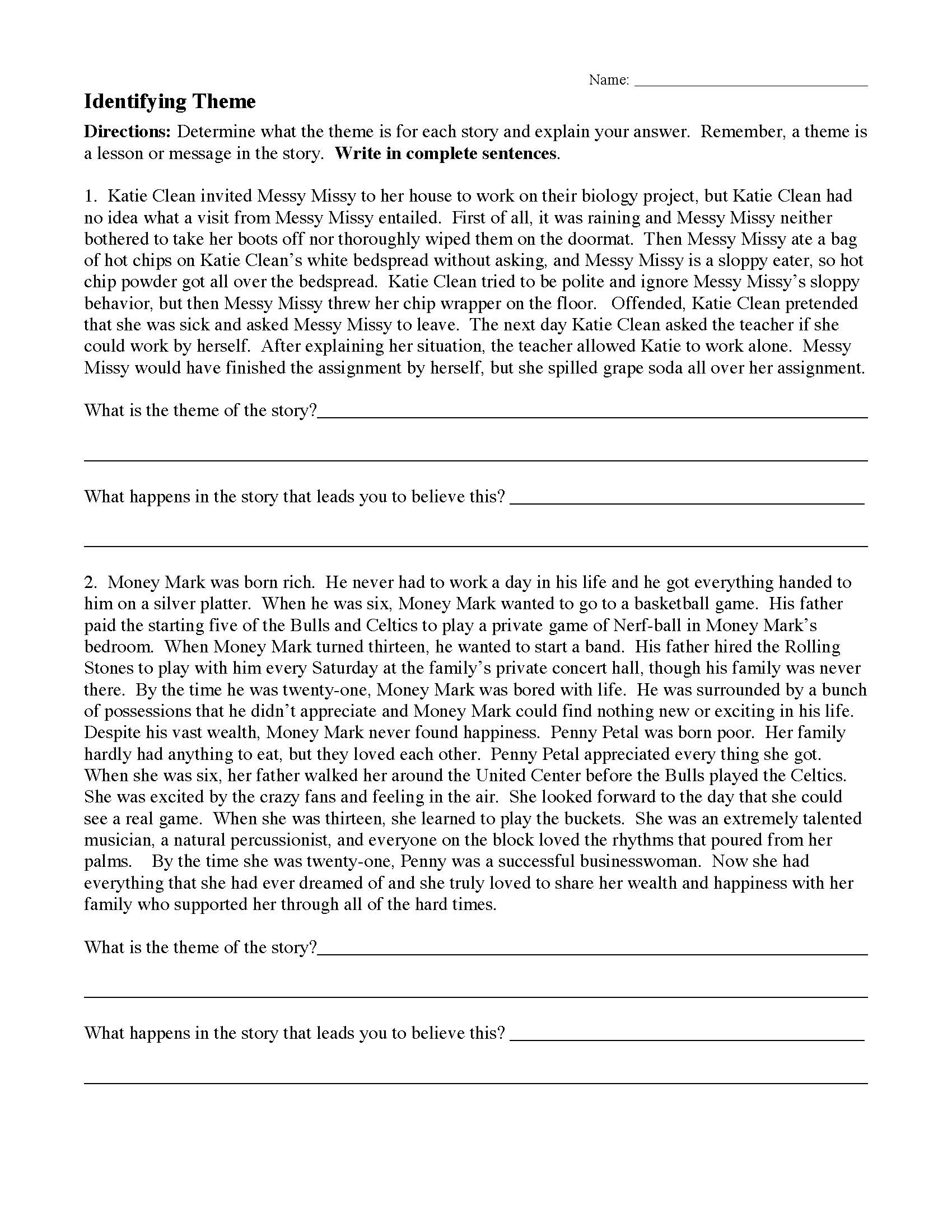
Theme Worksheet 2
Here's another engaging activity to help students practice identifying themes in short stories. In this worksheet students will read five original short story passages and determine the theme or message of the story. Also, they will explain how they got their answers. Suggested reading level for this text: Grade 4-8.
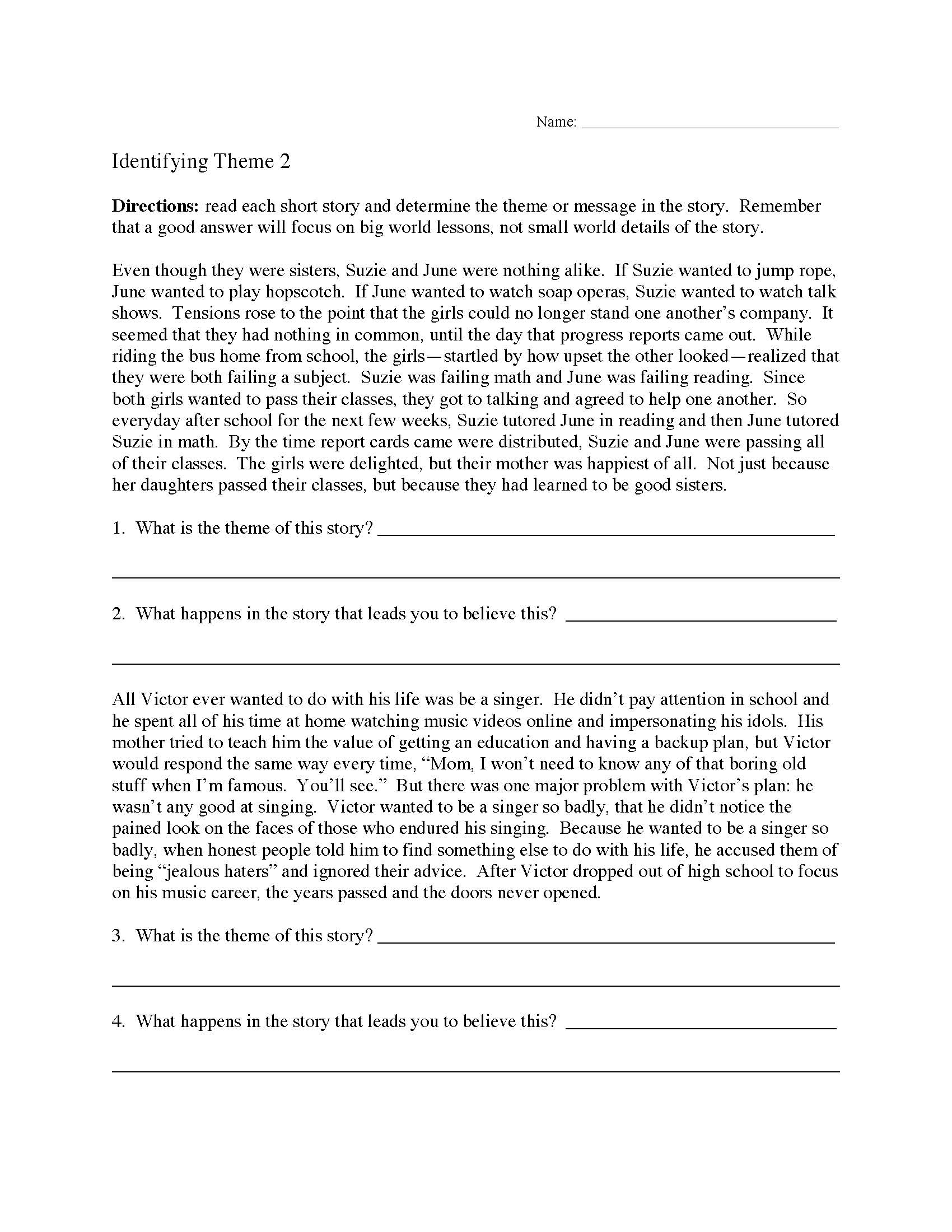
Theme Worksheet 3
Here's yet another theme worksheet to help your students master this challenging skill. Students read the short stories and extract the message. Then they support their answers with textual evidence. Suggested reading level for this text: Grade 4-8.
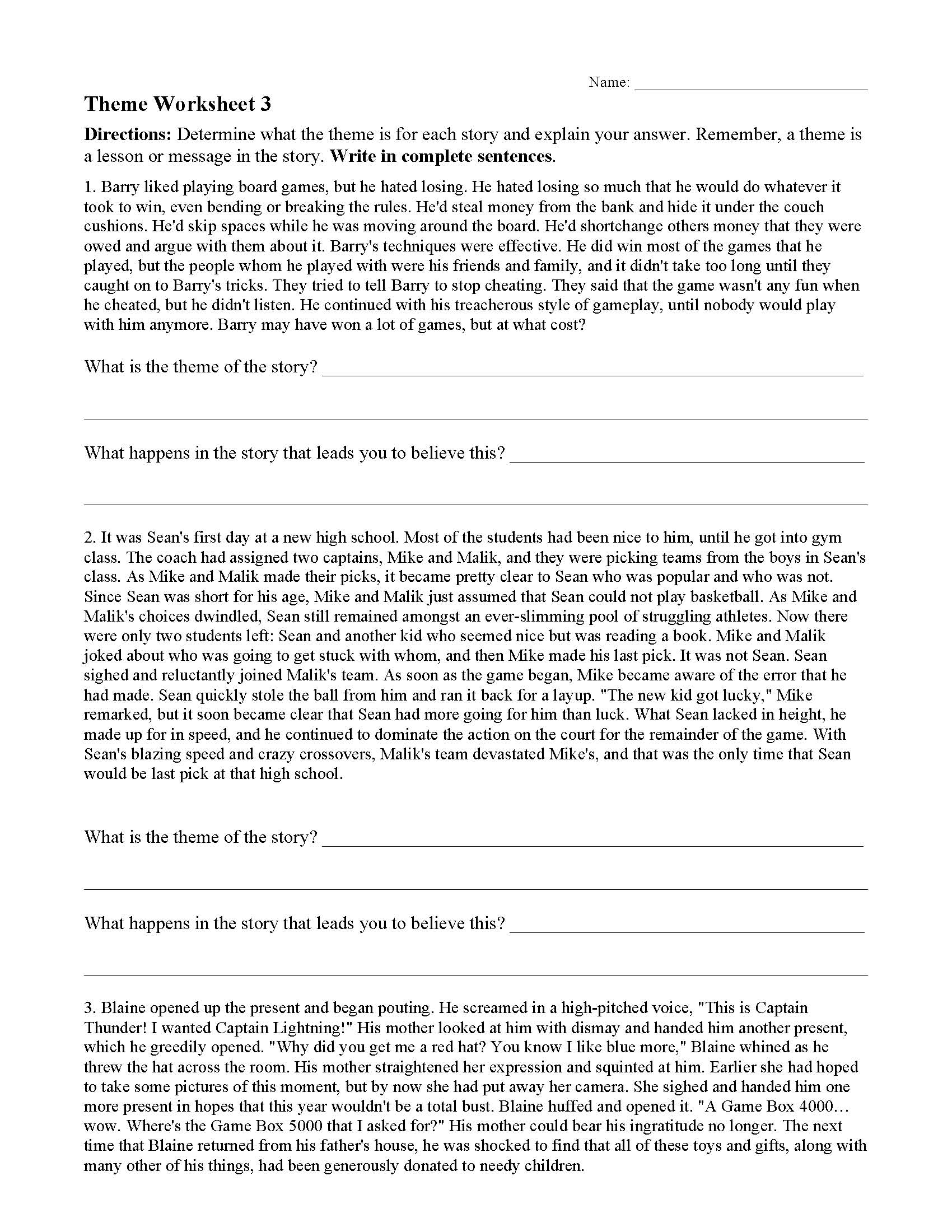
Theme Worksheet 4
Being able to identify the theme of a story is an important reading skill. Being able to support your answer with textual evidence is more important. This theme worksheet requires students to do both. Suggested reading level for this text: Grade 4-8.
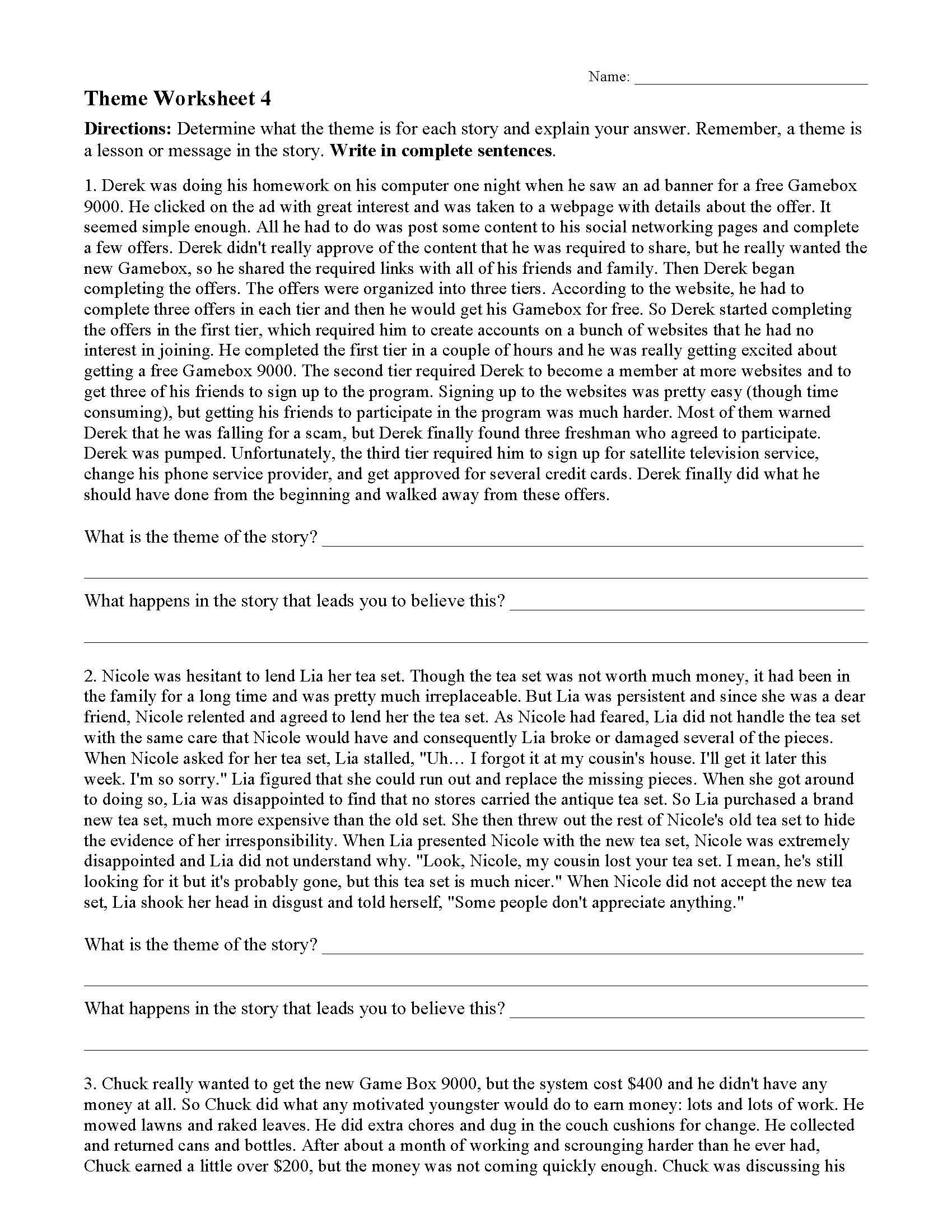
Theme Worksheet 5
Here is another double-sided theme worksheet. It has five passages from which students can extract a message. Students support their answers with textual evidence. Suggested reading level for this text: Grade 4-8.
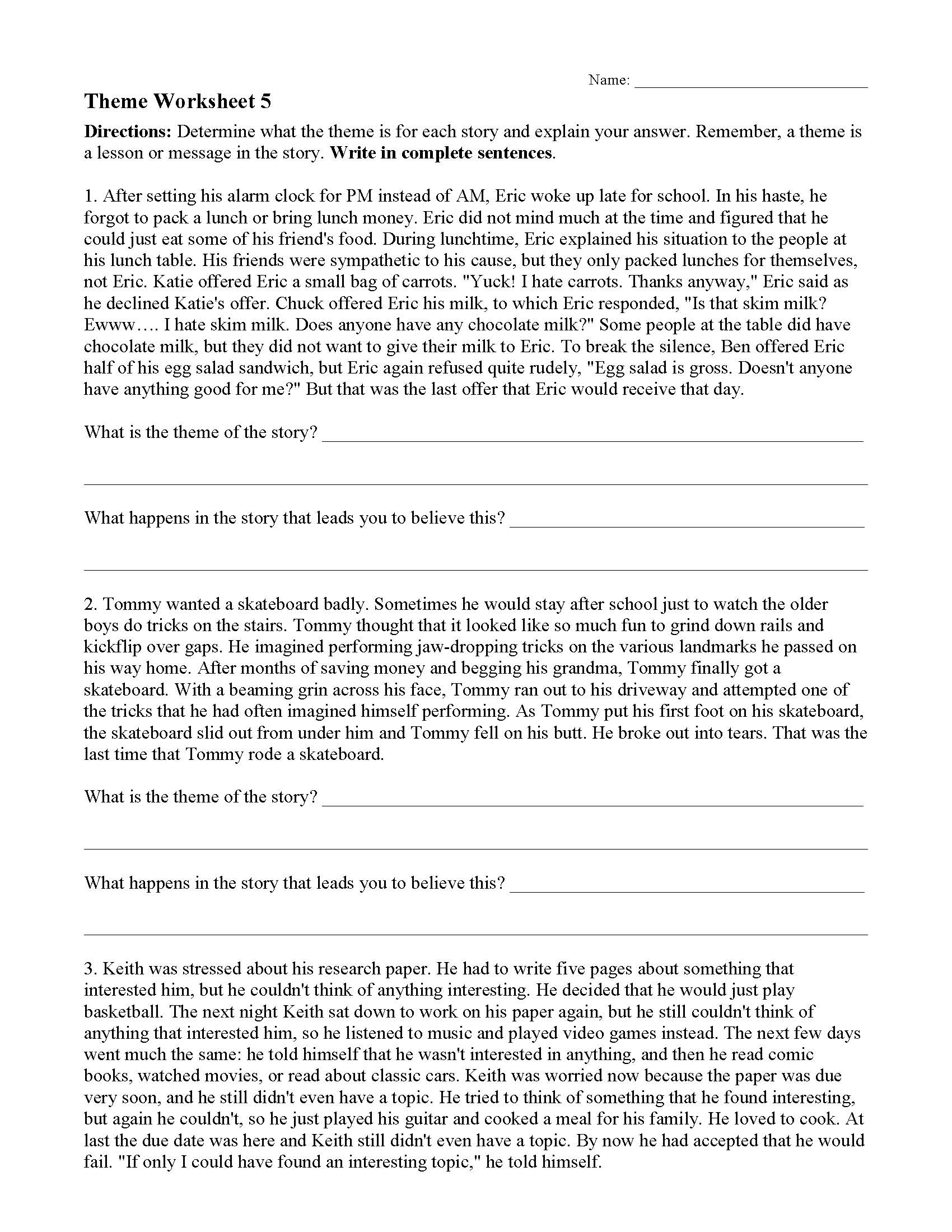
Theme Worksheet 6
This worksheet contains another five short stories to give students practice identifying themes. Students read the short stories, identify the themes, explain their answers using text. Suggested reading level for this text: Grade 5-9.
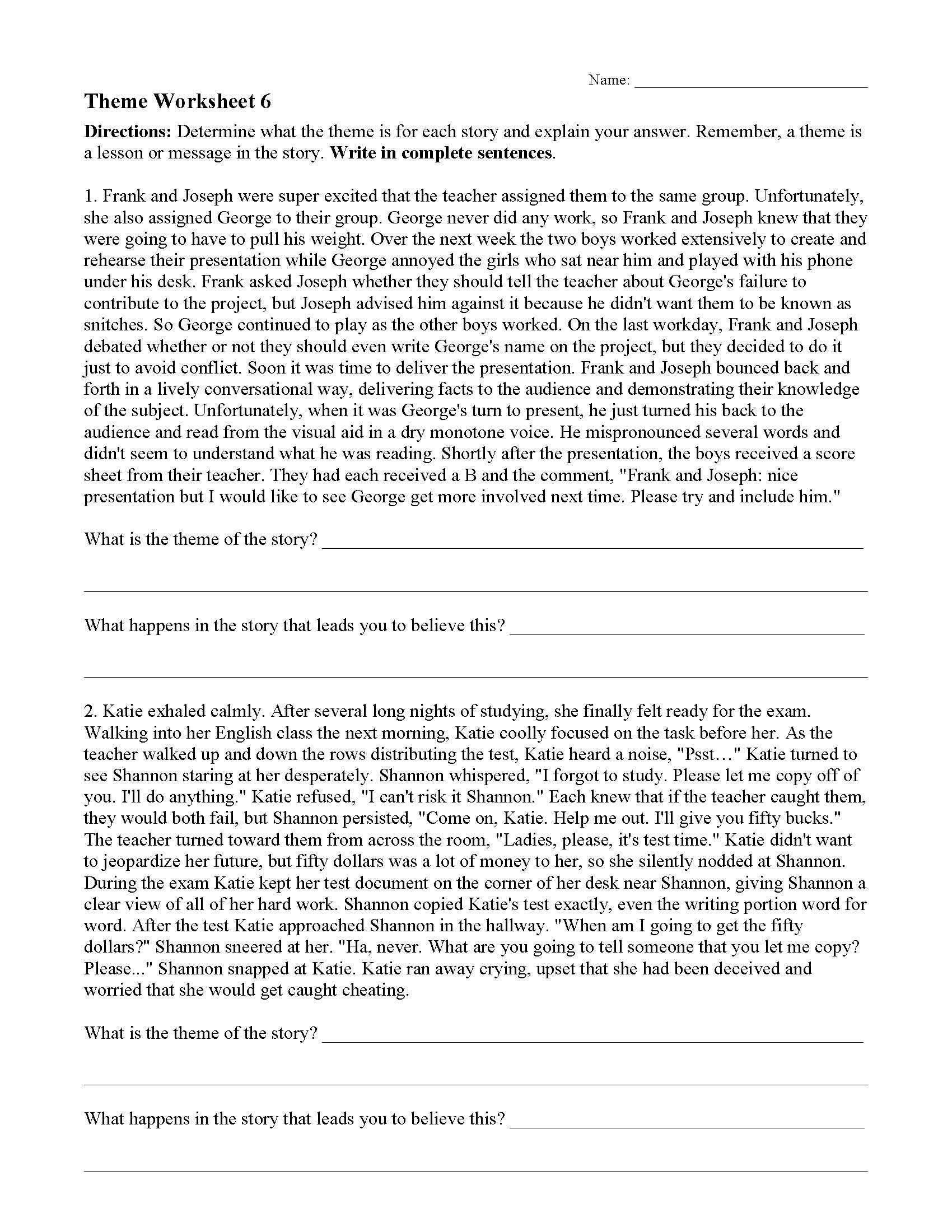
Theme Worksheet 7
This worksheet offers even more practice with identifying themes. Students read the short fiction passages and determine the life lesson of the story. They support their answers with textual evidence. These worksheets are aligned with Common Core State Standards. Suggested reading level for this text: Grade 4-8.
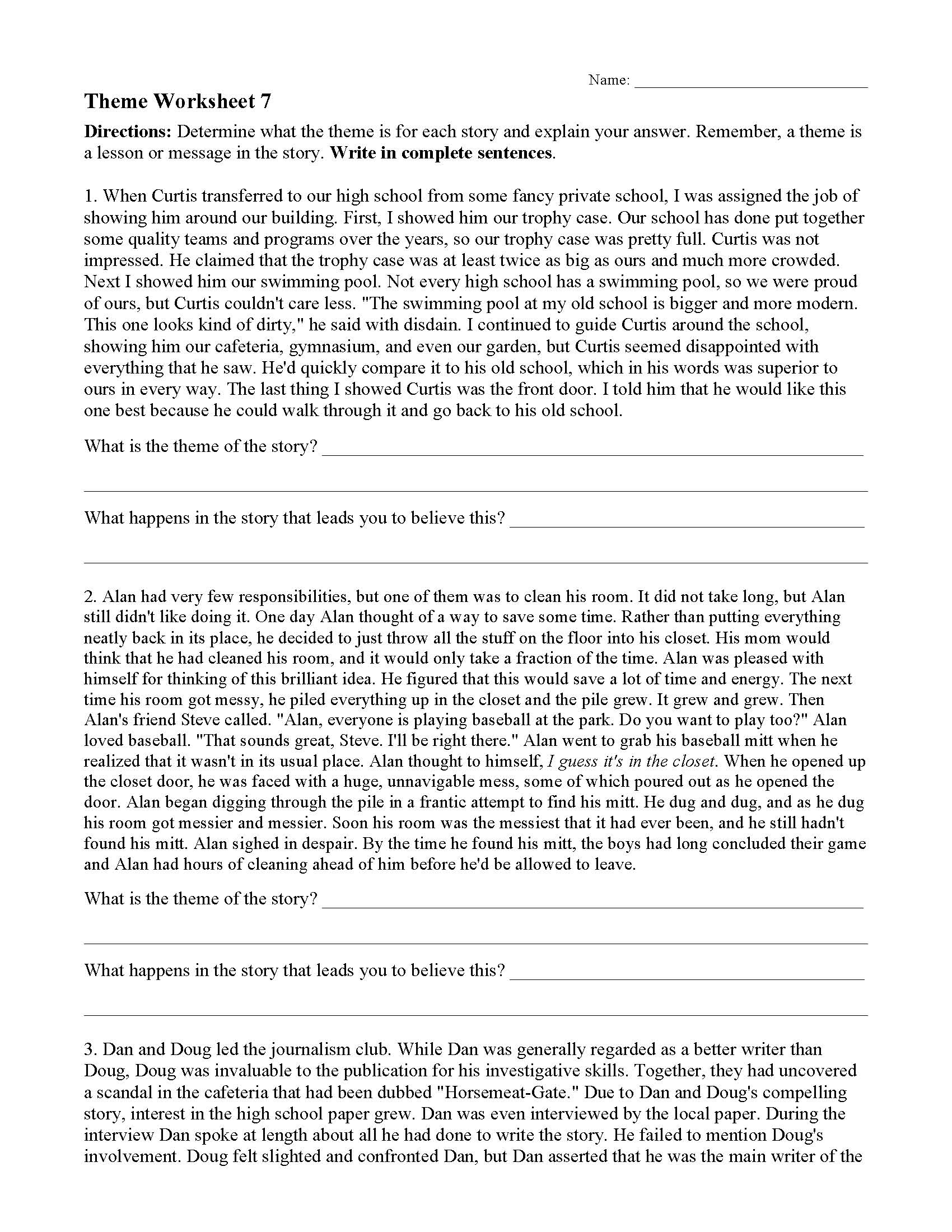
Understanding Theme with Fables 1
This worksheet features classic fables by Aesop. I have removed the explicitly stated morals. Students must draw conclusions to infer the meaning or theme of the fables. This worksheet is 4-pages and has 15 problems. Suggested reading level for this text: Grade 4-8.
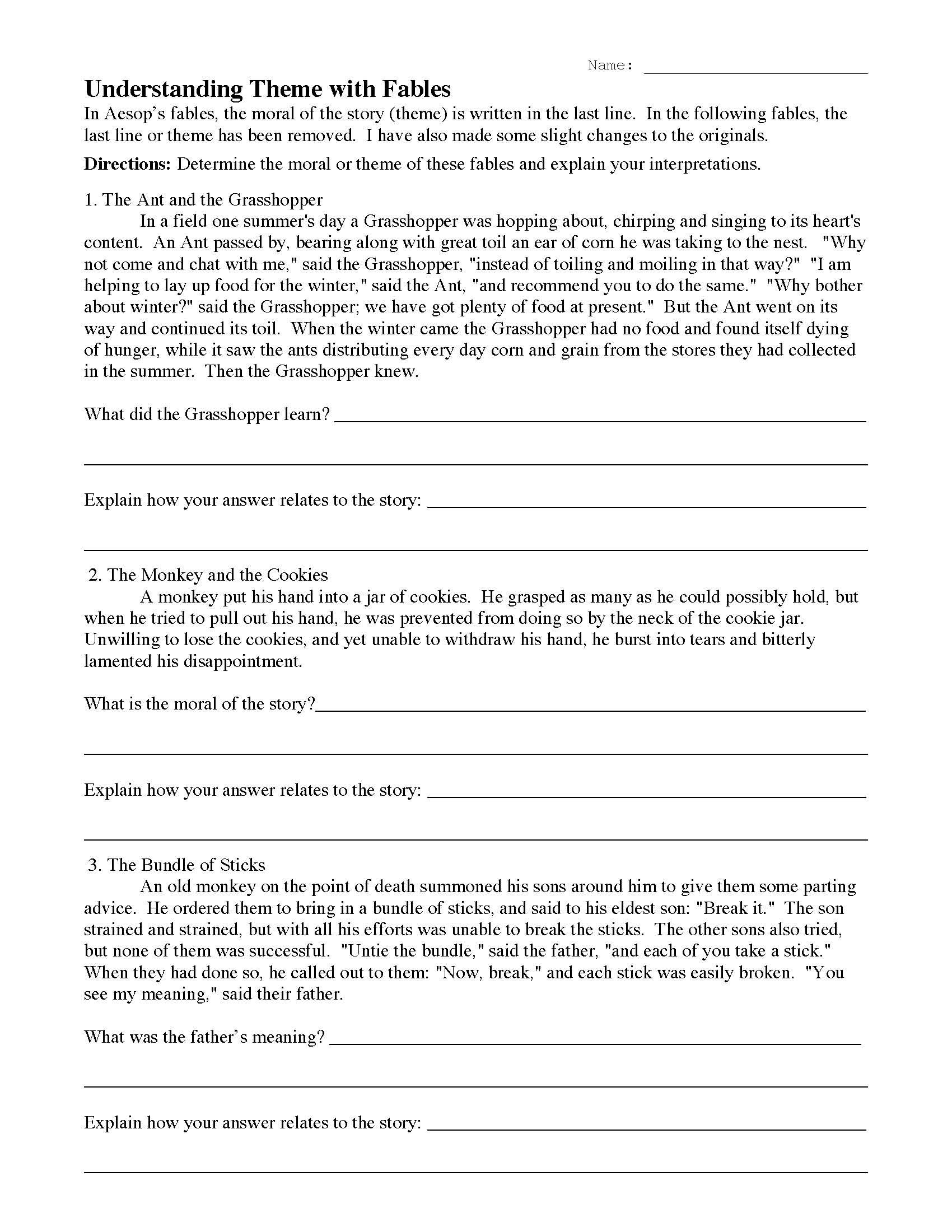
Understanding Theme with Fables 2
Here is another theme worksheet featuring classic fables by Aesop. Once again I have removed the explicitly stated morals. Students should read the fables and draw conclusions to infer the meaning or theme. This worksheet is 2 pages and has 5 problems. Suggested reading level for this text: Grade 4-8.
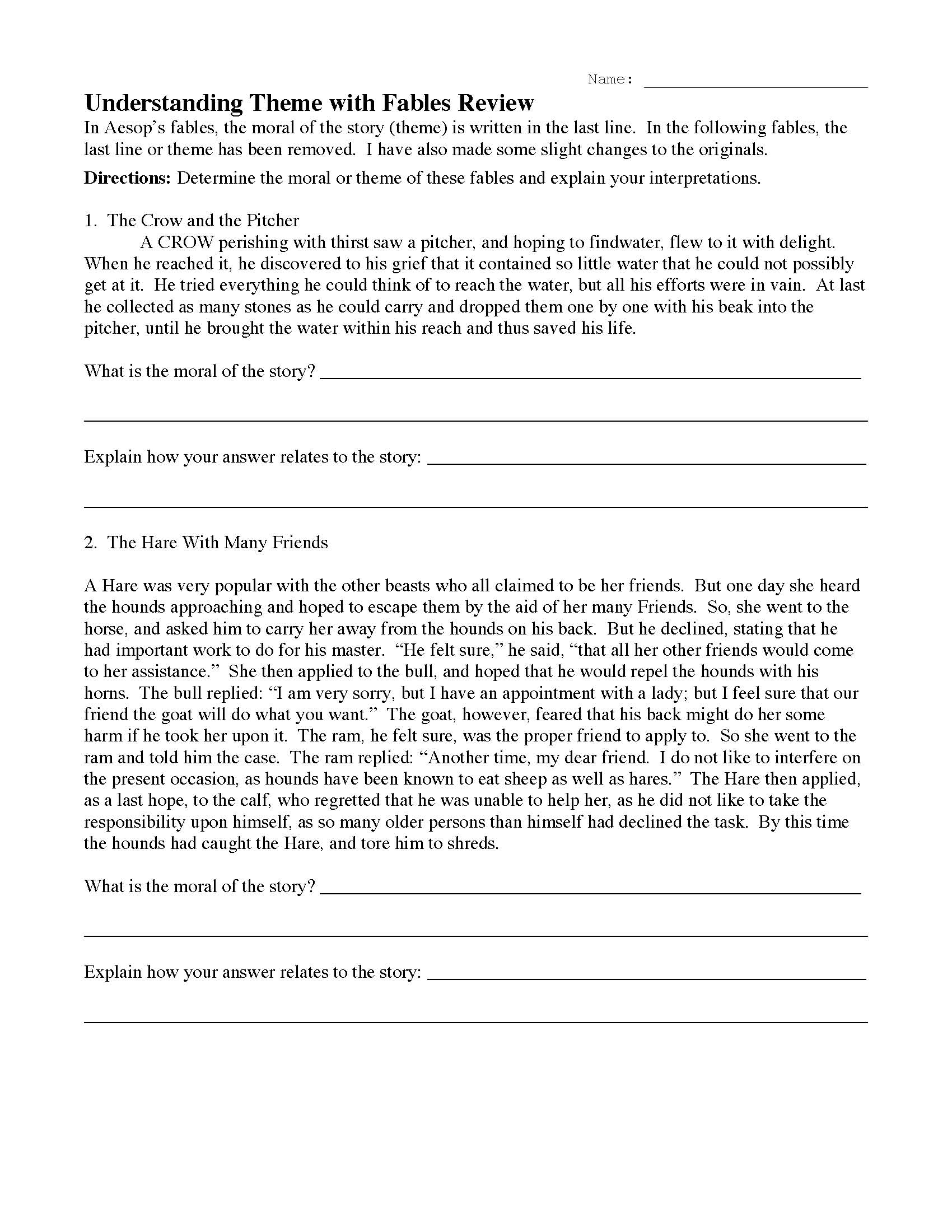
I hope that these theme resources help students meet learning goals.

Good readers can infer the author's theme or message.
Theme
Common Core State Standards
Theme Anchor Standard
R.2 - Determine central ideas or themes of a text and analyze their development; summarize the key supporting details and ideas.RL.1.2 - Retell stories, including key details, and demonstrate understanding of their central message or lesson.
RL.2.2 - Recount stories, including fables and folktales from diverse cultures, and determine their central message, lesson, or moral.
RL.3.2 - Recount stories, including fables, folktales, and myths from diverse cultures; determine the central message, lesson, or moral and explain how it is conveyed through key details in the text.
RL.4.2 - Determine a theme of a story, drama, or poem from details in the text; summarize the text.
RL.5.2 - Determine a theme of a story, drama, or poem from details in the text, including how characters in a story or drama respond to challenges or how the speaker in a poem reflects upon a topic; summarize the text.
RL.6.2 - Determine a theme or central idea of a text and how it is conveyed through particular details; provide a summary of the text distinct from personal opinions or judgments.
RL.7.2 - Determine a theme or central idea of a text and analyze its development over the course of the text; provide an objective summary of the text.
RL.8.2 - Determine a theme or central idea of a text and analyze its development over the course of the text, including its relationship to the characters, setting, and plot; provide an objective summary of the text.
RL.9-10.2 - Determine a theme or central idea of a text and analyze in detail its development over the course of the text, including how it emerges and is shaped and refined by specific details; provide an objective summary of the text.
RL.11-12.2 - Determine two or more themes or central ideas of a text and analyze their development over the course of the text, including how they interact and build on one another to produce a complex account; provide an objective summary of the text.
Click to VIEW Grade Level Standards for R.2
Still looking for something?
Search here.
Search here.
Leave a comment
188 Comments
Leave a Reply
By Using This Website You Agree to the Terms of Use and are aware of our privacy policy.
Subscribe Now
Get emails about new stuff.
Don't worry. I hate spam too.
Some Other Useful Pages
- Author's Purpose Worksheets
- Characterization Worksheets
- Conflict Worksheets
- Fact and Opinion Worksheets
- Figurative Language Activities
- Figurative Language Poems with Questions
- Genre Activities
- Irony Worksheets
- Making Predictions
- Mood Worksheets
- Nonfiction Passages and Functional Texts
- Parts of Speech Worksheets
- Poetic Devices
- Point of View Worksheets
- School Project Ideas
- Setting Worksheets
- Simile and Metaphor Worksheets
- Story Structure Worksheets
- Text Structure Worksheets
- Theme Worksheets
- Tone Worksheets
- ALL PAGES AND WORKSHEETS
Search This Site







Jenny
/ June 23, 2023Thank you so much for all these resources. I find them very useful when it comes to teaching my students.
Genevieve G
/ March 31, 2023I love your site. Thank you for the free resources to use with my students. I really appreciate you providing them.
Quinn
/ December 22, 2022Thank you! during my winter break I have been reading your worksheet and powerpoint which will help me when I return. I am a beginners teacher. ELA/ICR teacher. Again thank you. Just what I needed.
editha galo
/ April 3, 2022Thank you very much, you relly of big help to us
Janet K.
/ March 10, 2022And – to add – this is an awesome resource. Thank you so much for sharing it!
Janet K.
/ March 10, 2022How do you find the students’ results? Not sure where to find report if there is one? Thanks!!
Mr. Morton
/ September 24, 2022They have to send them to you. I will look into the Classroom API again soon, but last I checked, I couldn’t do what you and I both want it to do.
Stephanie Hampton
/ January 6, 2021I really appreciate having a resource like this! It makes lesson-planning so much easier, especially when you can edit the resources to differentiate for students. Thank you so much for all of this!
KittyPom
/ January 2, 2021The useful website
Lily (Student)
/ October 26, 2020I love this site because it tells you everything we need. I think this is a pretty neat website, thank you.
Ll
/ August 8, 2019Hi, I was wondering could you send me a full sample essay about the theme so I could get a better understanding of it. Thank you.
Quintrell Williams
/ May 16, 2019fourth grade
Time for themessage
Key-theme
Analie S. Canete
/ June 25, 2018Thank you so much for helping me be ready to teach my students. It’s a big help that makes my work easier and more effective! God Bless!
Mr. Morton
/ June 29, 2018Thank you for the blessings!
Alan Chacon
/ December 13, 2017could you please provide an answer key to these lessons because I can’t tell if I am correct with my inferences. I understand how to identify them a little better, but if I knew I was correct it would help me and maybe some others with how they should think and if they are in the correct mindset It would help them indulge in positive reinforcement please read this and consider others learning process in your decision.
Mr. Morton
/ December 13, 2017There are answer keys. Click the links that say “View Answers” underneath the assignment sheets.
mariecel reynes
/ February 15, 2017the objective of my lesson is to explain how the elements build its theme, would you mind to please provide me materials for the evaluation of my lesson.tnx much
Burnett
/ February 9, 2017I loved these passages and powerpoint! I used them for my fourth grade class and they were right on target for their level. Thank you!
Pam
/ January 15, 2017I want to express my gratitude to you for providing these wonderful resources-free of charge! I love visiting your site.
ece huner
/ October 20, 2016In our lessons we are studying the difference between moral and the theme but in your pdf s it kinda says that there are the same thing. so what is the difference between them. Thank you 🙂
Mr. Morton
/ October 26, 2016They are similar, but a moral is usually explicitly stated, where a thematic statement is implied.
Antonio Soto
/ October 19, 2016at first i thought this would be a bad website, but now i stand corrected this site has helped me and my classmate with numerous amounts of classwork and homework
Mourad Romdhani
/ October 12, 2016A very helpful course for both student and teacher. Thank you very much for such high quality lessons.
Park
/ May 25, 2016Thank you very much for the great resources. I’ve been engaged with searching for such materials very long! and they are helpful for me and my class at school. And thank you for the great website!!
Nick Muzekari
/ December 22, 2015I will be teaching an online short story class this summer for the first time. I’m new to this and so am looking for material to help myself and the students. I believe I will get paid for teaching the class so I am asking permission to use EReading materials since I really love them and want to use them in the class. May I have permission?
Mr. Morton
/ January 19, 2016Certainly.
eileen
/ March 3, 2016hi Mr.Morton. i am having trouble on a theme packet that my teacher assigned me for homework . i do not understand what a theme is. can you help me??????
Mr. Morton
/ March 15, 2016Theme is the message of a story, the lesson that the author intends to impart through his or her story. So, read the story and ask yourself, is there a lesson to be learned here? Put that lesson into words, and you can say that you have found a theme in the story. Best wishes!
Jennifer Reed
/ October 28, 2015After reading the comments, they struck home for me. My colleagues and I are always discussing the definition of theme. For me, I think it is fair to differentiate for the student between universal and literary theme.
I make sure to talk to students about the definition of Universal Theme, one word, and the literary theme described here. Sometimes my at-risk students have to zero in on the one word before they can get to the generalization. If not, I end up with a main idea or plot summary instead.
I hope this helps, or adds to the discussion.
Mr. Morton
/ October 28, 2015Great contribution. Thank you.
Denise Ramos
/ October 19, 2015I appreciate these lessons and the guidance you provide! I am a beginning teacher, and I feel frazzled at times about how to put things, but your resources are very helpful. I was wondering, how did you become so good at creating lessons? Were there any books that helped you? Or was it time and practice that helped you organize your plans and lessons so well?
Mr. Morton
/ October 26, 2015I like to think that I have a way of getting to the point. I can’t recommend any books or resources that helped me out in any significant way. I can only point to the amazing teachers who inspired me and helped me grow. I’ve worked at some pretty messed up schools, but no matter how bad things were at times, there were always amazing people doing amazing things. I will never be the superb disciplinarian that Mrs. Smith, Mr. Dillard, or Mr. Tang were, but I’ve taken a little piece of them with me. I will never be as organized or as motivating as Mr. Phoenix was with his students, but I carry a little piece of him with me.
Find the teachers that inspire you. Fight to observe them. Take what you can.
That’s pretty much the best advice that I can give you about that topic.
Thank you for visiting my site and posing such an interesting question.
Best wishes!
Danyell
/ October 15, 2015I, too, love this site and appreciate the information and activities. It is so helpful… I was wondering if you could add some expository writing activities.
Mr. Morton
/ October 19, 2015Like these expository writing prompts or did you have something different in mind?
Karen Schonewise
/ October 2, 2015THANKS so much. This site is great. I almost lost it on a student today who was trying to tell me theme was one word after I have spent a month teaching these juniors in high school that it is a sentence!!! This site is awesome!!
Mr. Morton
/ October 2, 2015Ha ha. It’s funny you say that. I’ve gone back and forth with terminally educated adults about this. I think a Common Core ELA glossary (like the one that they have for mathematics) would go a long way in resolving this debate. I also think that the word motif better fits the “a theme is one word” thing. Anyway, thanks for visiting the site and taking the time to comment. Best wishes!
Romel L.
/ September 30, 2015You are the best. I am at a loss of words oh how to express my gratitude to you and this website that you have created. AWESOME-RIFIC!!!!!!!!!!!!!!!!!!!!!!!!!!!!!!!!!!
Mr. Morton
/ October 1, 2015I love the word that you invented. Thank you for visiting.